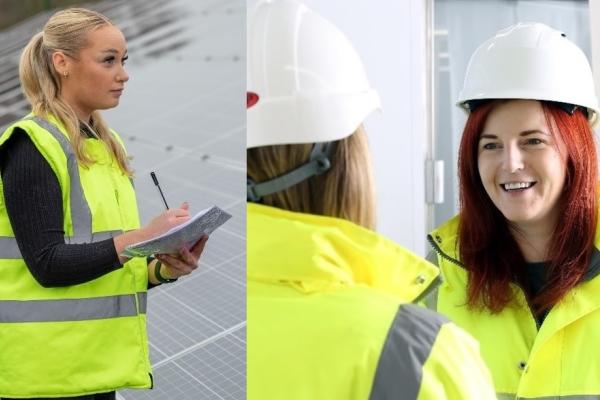Highlighting the importance of equipping our workforce with the right skills and opportunities and how one route doesn’t fit all.
As our economy transitions to support the Welsh Government’s net zero ambitions, it’s important that we equip our workforce with the right skills and opportunities. Already, there are an ever-increasing number of options when it comes to training and skills, where one route certainly doesn’t fit all.
Take Molly Salter and Tesni James from north Wales; while they are both gaining qualifications towards a career in net zero, they are taking very different paths.
Molly is a 20-year-old who achieved five A-levels and decided that full-time university wasn’t for her. With a keen interest in climate change, she secured a Low Carbon Energy Efficiency degree apprenticeship at Wrexham Glyndwr University, employed by Flintshire County Council:
“I always wanted a career that was at the forefront of society and that was forward-looking. When I saw this apprenticeship advertised, it was the dream job that I never knew existed! It was perfect because I was specifically looking for a degree apprenticeship and I have a real passion for climate change. I go to university one day a week and then I work in my role as a Climate Change Project Assistant for the council the rest of the week.”
Her typical day involves trying to source land for council projects such as tree-planting, biodiversity, solar panels and wind turbines and preparing the council’s climate change newsletter, which raises awareness among residents of how the local authority is reducing carbon emissions.
Having started the apprenticeship in September 2022, she is excited for her future:
“This area of work is growing. It’s the way forward. I’m excited to see what the future holds – I don’t know what sector I’ll ultimately work in, but I do know that with the skills I’m learning, I can make a big impact.”
Tesni James, meanwhile, has re-trained after having her family. A social worker for nine years, she decided to join the family’s construction business, based in Blaenau Ffestiniog. Tesni wanted to gain industry qualifications but, with three young children, wanted to study flexibly.
At her local college, she enrolled onto a Welsh Government-funded Personal Learning Account course to gain the NEBOSH Environmental Management Certificate. The qualification is designed to give learners the knowledge and understanding to help organisations manage their environmental issues.
Tesni commented:
"I gained my Environmental Management Certificate through the PLA-funded course as well as different Health and Safety qualifications. PLAs are fantastic – I did mine through Coleg Llandrillo but I undertook them online. It suited me not to have to travel into college because it worked around the children and the business."
PLAs are fully-funded courses and qualifications that are flexible so that people can train around existing responsibilities in order to progress in a current job or change careers altogether.
An additional investment of £2 million by the Welsh Government into green PLAs is supporting Wales’ drive to net zero. The eligibility salary cap has been removed for those upskilling or reskilling in green qualifications in construction, engineering, manufacturing and energy.
“As a business, we are keen to look at ways in which we can be more environmentally friendly. Since my studies, we’ve increased our recycling efforts and we are looking at how we can insulate and heat our offices more efficiently. The course made me more aware of the regulations and it has helped demonstrate our commitment as a business to net zero. I would encourage others in the industry to take a look at PLAs – they are free qualifications and are available at local colleges across Wales.”
Tesni, aware of how net zero will directly impact the construction industry, is now exploring options to study an MSc in Occupational Health, Safety and Environmental Management.
Working behind the scenes in Wales’ efforts to achieve net zero are the four Regional Skills Partnerships. Sian Lloyd Roberts is the North Wales Regional Skills Manager:
“The Regional Skills Partnerships play a vital role in ensuring that suitably skilled workers are meeting the needs of employers. We act as a bridge between training providers – like colleges - and employers, raising the profile of the training available but also gaining an understanding of the skills needed across Wales.
“Green or low carbon related skills are at the forefront of our remit and is a huge part of what we do. It is our role to help address skills gaps and shortages, working closely with Welsh Government, and we’re really very pleased with the strength and the variety of training and qualifications available in North Wales.”
But there is certainly no complacency within the North Wales Regional Skills Partnership:
“There is always more to do, of course, especially in such a fast-evolving sector.”

